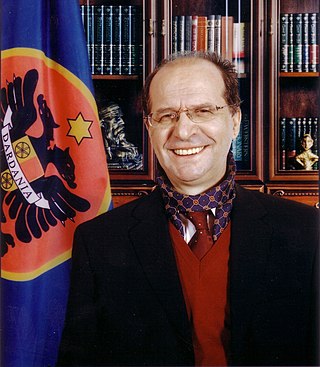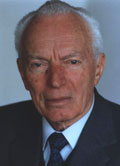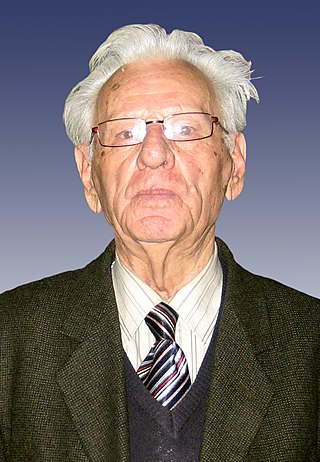Nehat Islami (born 1943 in Ferizaj, Albanian Kingdom during World War II) is a journalist from Kosovo.
Contents

Nehat Islami (born 1943 in Ferizaj, Albanian Kingdom during World War II) is a journalist from Kosovo.

Nehat Islami graduated from the University of Zagreb Faculty of Law in 1966 . He began his journalistic career in “Rilindja” the only daily newspaper of that time published in Albania and in Kosovo. A year later he moved to the RTP newsroom (Radio Television of Pristina). From 1974 to 1979 he was the Middle East newspaper correspondent in Beirut. After returning to Pristina, he was appointed Editor of Foreign Policy. He remained in that position until mid-1990 when “Rilindja” was banned by the Serbian authorities. From 1999 to 2002, he was the Project Manager of the Institute for War and Peace Reporting - office in Pristina. [1] Since 2005, he directs the Office of the Press Council of Kosovo. [2]
During his journalistic career, Nehat Islami has interviewed prominent world personalities, such as: Mother Teresa, Yasser Arafat, French poet Jasques Prevert, Croatian writer Miroslav Krleza, the president of Iraq Talabani, and the King of Jordan Hussein. He is the author of over 200 TV reportages and documentaries and thousands of press reportages and articles from Kosovo and abroad. In December 2013 in Pristina, Kosovo the Publishing House Koha published his first book “Hotel Bejruti” (Hotel Beirut). The book is in Albanian and is a summary of Nehat Islami’s journalistic reports and analyses from Middle East. His second book “Një adresë në Bukuresht” (An address in Bucharest) was published in 2016, a summary of articles and interviews collected within a period of 40 years.

Ibrahim Rugova was a Kosovo Albanian politician, scholar, and writer, who served as the President of the partially recognised Republic of Kosova, serving from 1992 to 2000 and as President of Kosovo from 2002 until his death in 2006. He oversaw a popular struggle for independence, advocating a peaceful resistance to Yugoslav rule and lobbying for U.S. and European support, especially during the Kosovo War.
Adem Demaçi was a Kosovo Albanian politician and writer.

Fadil Hoxha was a Yugoslavian ethnic-Albanian communist revolutionary and politician from Kosovo. He was a member of the Communist Party and fought in the Yugoslav Partisans during World War II. After the war, he was the first President of the Executive Council of the Autonomous Region of Kosovo and Metohija (1945–1963) and later member of the Presidency of Yugoslavia (1974–1984).

Mehdi Bardhi was a Kosovar linguist, author, and teacher.

Mark Krasniqi was an Kosovar Albanian ethnographist, publicist, writer and translator who did most of his work while residing in Yugoslavia.
Avni Spahiu is a Kosovar diplomat and former television director. During the period between 2008 and 2012 he served as ambassador to the United States. He was the Republic of Kosovo's ambassador to the Republic of Turkey from 2012 to 2019.
Albanian comics, though not well known internationally, were produced mainly by comic-authors from Kosovo. Until recently there was no comic tradition in Albania where comics were seen as junk literature known as fumeti supposedly because pop art was prohibited by the dictatorial communist regime. Today there is one comic magazine published in Kosovo called Leon, and there is Tafë Kusuri comic-strip together with Garfield and Calvin and Hobbes published by Koha Ditore newspaper.
Esad Mekuli was an Albanian poet, critic and translator. He was the first president of the Academy of Sciences and Arts of Kosovo. Robert Elsie considered him the father of modern Albanian poetry in Yugoslavia, and his influence in Kosovo remains immense.
Skënder Rizaj was a Kosovar Albanian scholar and historian born in Peja, Kingdom of Yugoslavia). He specialised in the Ottoman period of Balkan's history.
The literature of Kosovo is composed of literary texts written in Albanian, Serbian, Bosnian, and Turkish, specifically by authors of Kosovo. Kosovo produced several prominent writers in the Ottoman era. However, Ottoman authorities banned the written use of the Albanian language until 1912. This policy continued during Serb rule until the outbreak of World War II.

The Kosovo student poisoning refers to the alleged poisoning of thousands of Kosovan young people by toxic gases that occurred on 22 March 1990. As a result of a lack of information this incident was named the "mysterious disease" at first. Many had fainted, vomited or had violent convulsions. Almost all had inflamed eyes and a distinct facial flushing. The disease continued to strike the population for the rest of the year and 7,421 Albanian Kosovars were stricken with illness. Since then, research has been undertaken by both Albanian and foreign nuclear experts, and they have been persistently confronted with a failure to reveal a common conclusion.
Nijazi Ramadani is a Kosovar Albanian poet, novelist and literary critic.

The media in Pristina includes some of the most important newspapers, largest publishing houses and most prolific television studio. Pristina is the largest communications center of media in Kosova. Almost all of the major media organizations in Kosova are based in Pristina.
Music composition and composers in Pristina refers to music composition and composers who have left their mark in Pristina. The importance of Kosovan Folklore on the different genres, their development and their popularity. As referring to genres as a categorization would not cover all compositions and composers in a fair way, a highlight of every composers work and different genres is provided because of the different genres a composers work has included throughout the years.
Dauti Dauti was born in 1960 in Kokaj, near Gjilan, in Kosovo. He graduated from the University of Pristina Faculty of Law. He continued post-graduate studies at the University of West London and was awarded a PhD from the University of Leeds School of History, on thesis: The British Foreign Policy and the Albanian Question 1876–1914.

Idriz Ajeti was an Albanologist from Kosovo and one of the main researchers and authorities on the Albanian language studies of post World War II. He was involved for a long period in the academic life of the University of Pristina, and was a member of the Academy of Sciences and Arts of Kosovo, being its chairman for seven years.

Kadrush Radogoshi is an Albanian poet, novelist, play-writer, and literary critic from Kosovo. He is a dissident who opposed the revocation of the autonomy of Kosovo from the Milosevic's regime, consequently being arrested and imprisoned. Radogoshi served as President of Writers' Union of Kosovo. In 2010, he settled in Canada.
Daut Demaku born on October 13, 1944, in the Abria village, is Albanian writer and lecturer of the course "The Art of Positive Thinking".
Musë Prelvukaj is a Kosovar artist born in Martinovići, near Gusinje and Plav in what is now Montenegro, on December 25, 1950.

Lazar Vučković was a Serbian and Yugoslav poet. Along with poets and writers Petar Šarić, Vukašin Filipović, Darinka Jevrić, Radosav Stojanović and Vladan Virijević, he is considered one of the leading 20th-century Serbian writers from Kosovo and Metohija.